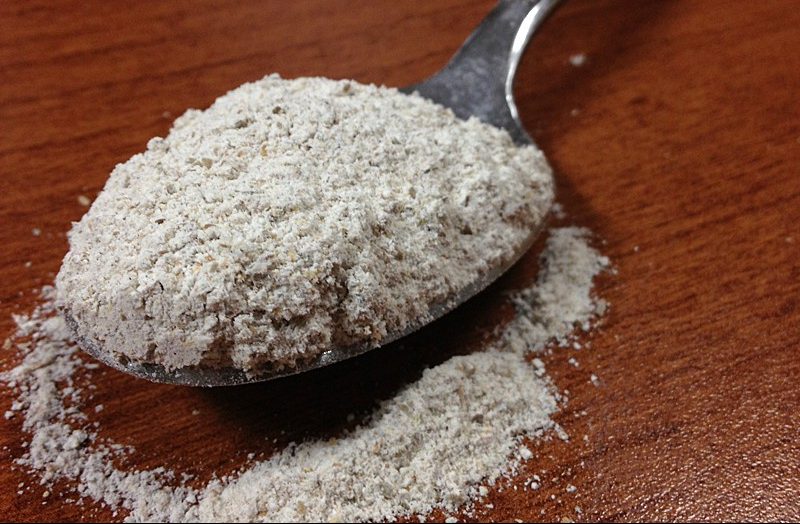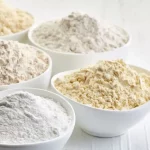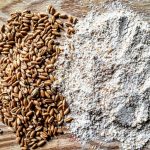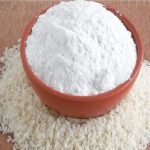Rye Flour Substitutes

Rye flour is a type of flour that is produced by the milling of rye grains. It is a dark flour-like substance that is a popular ingredient used by many people around the world when making different recipes. Finding the right substitution for rye flour is what this article is all about.
Rye originated in the southwestern region of Asia but it had spread to other parts of the world with eastern Europe being the major producer today.
There are different varieties of rye flour available, and they are light rye flour, medium rye flour, dark rye flour, and pumpernickel flour. Rye flour is known to have a noticeable nutty flavor with a dense texture and a distinctively bitter taste. It also contains gluten so it may not be ideal for a lot of people.
As for nutritional value, rye flour is known to be a good source of dietary fiber, carbohydrates, iron, protein, vitamin B6, magnesium, and potassium. All of these are useful nutrients with numerous health benefits.
Over the years, rye flour has been used to make fruitcakes, gingerbread, crackers, scones, crispbread, and pumpernickel bread. Occasionally, it has been used as a filler for sauces and soups. Pumpernickel bread is arguably the most popular rye flour product so if you’ve eaten it you should know how rye flour tastes.
However, what happens if you’re about to make a recipe that calls for rye flour and you find out you have run out of it or have to replace rye flour for any reason? That is when this article becomes incredibly important as I have compiled a list of the best rye flour substitutes that works very well and with excellent nutritional value like rye flour itself.
Without any further ado, let’s dive into the list of the best substitutes for rye flour.
Substitution For Rye Flour
Barley Flour
Barley flour is a type of flour that is obtained after barley is dried and then ground. It is a light brown substance with a flour-like consistency. It is said to have originated in Ethiopia and Southeast Asia but it is now grown in other regions with Russia being the largest producer.
Barley flour is one of the top options for you to consider if you are looking for a substitute for rye flour as they have a few things in common.
Barley flour has a noticeable nutty and earthy flavor with a dense texture and a slightly bitter taste which is similar to how rye flour tastes. This makes it work well as a substitute when making baked food.
Barley flour is known to be a good source of dietary fiber, carbohydrates, potassium, and iron, all of which are useful to the body. It contains less gluten than rye flour but that doesn’t make it good enough for those who eat healthily. Over the years, barley flour has been used to make flatbread, barley bread, and other types of food.
When using barley flour as a substitute for rye flour, make sure to use the same quantity as you would have used rye flour. This will make sure you get the best results.
Wheat Flour
Wheat flour is one of the most popular flour in the world as a lot of things are produced using it. It is the most common in the baking industry as a lot of baked foods have it as a key ingredient. Wheat flour is said to have been discovered by the Romans and today, China is the largest producer of wheat.
Wheat flour is a fine powder obtained after wheat used for human consumption is ground. It has a lot of varieties that are used for different meals.
Wheat flour is one of the options you have if you are looking to replace rye flour. It does a good enough job of being a substitute when making bread, pastries, desserts, and many other recipes.
Wheat flour is said to have a neutral flavor so the other ingredients that it is cooked play a big role in how the food tastes. It also lacks the bitter and nutty taste that you’d normally get with rye flour.
Wheat flour contains gluten so keep that in mind if you’re shopping for gluten-free rye flour substitutes. It is a great source of thiamine, niacin, riboflavin, vitamin B6, manganese, iron, magnesium, phosphorus, and zinc
Wheat flour is common so you’d find it easily. When using it as a rye flour substitute, take close to the same quantity as you would have taken rye flour.
Buckwheat Flour
Buckwheat flour is a product that is made from the buckwheat plant, a pseudo-grain. The whole buckwheat groats are ground into a fine white-gray flour-like substance that is known as buckwheat flour. It originated in western China but is now spread across countries around the world.
Buckwheat flour is one of the substitutes for rye flour that you should consider. It has a slightly bitter taste with a nutty and earthy flavor which reminds one of rye flour.
Buckwheat flour contains no gluten which makes it a great option for those who eat healthily or can’t eat gluten. Over the years, it has been used to make unleavened bread, soba noodles(see substitutes for yakisoba noodles), cookies, and crepe batter.
As for nutrition, buckwheat flour is known to be rich in copper, manganese, dietary fiber, magnesium, antioxidants, and resistant starch. All of these are useful to the human body and can help to moderate blood sugar levels and boost heart health.
When using buckwheat as rye flour replacement, take the same quantity of buckwheat flour as you would rye flour to get a good result. Keep in mind that because buckwheat flour can’t rise, it will not work as a substitute in bread recipes.
Spelt Flour
Spelt flour is a type of whole wheat flour that is made from spelt. It is said to be native to Iran but it is now cultivated in other regions across the world. Spelt flour is obtained after milling kernels of spelt wheat to produce a light reddish-brown flour-like substance.
Spelt flour is another substitute for rye flour that you can go with as they share a lot of similarities. It has a nutty and earthy flavor with a mildly tangy and bitter taste and a coarse texture.
Being a form of wheat, spelt flour also contains gluten which may not be good for some people. Over the years, it has been used when making cookies, bread, muffins, and other foods where wheat flour is used.
Spelt flour is known to be a good source of dietary fiber, protein, and antioxidants. It also contains some vitamins and minerals that are needed by the body.
Something to be mindful of when substituting rye flour with spelt flour is that, due to the dense nature of spelt flour, you have to use half the quantity that you would normally use for rye flour. For example, take half a cup of spelt flour to replace one cup of rye flour. If you use spelt flour frequently for baking you might need to check out some spelt flour substitutes.
Rice Flour
Rice flour is a type of flour that is made from finely milled rice and over the years, it has been used for different things as it is quite versatile. It can be made using either brown rice or white rice, and it is obtained after raw rice (free of husk or paddy) is ground into a fine powder. It originated in East Asia where it is used to make different local recipes.
Rice flour is gluten-free which makes it ideal for those who are gluten intolerant or want to eat healthily. It is high in carbs and provides quite some amount of protein, magnesium, and vitamin B6.
Over the years, it has been used to make rice cakes, buns, and macaroons. It can be used as a thickener for many recipes, and it also works as a coating for chicken and fish to give them a crispy surface after frying.
Rice flour does a decent job of being a substitute for rye flour. It is best to use brown rice flour as it has a slightly earthy flavor, similar to rye flour.
When using rice flour as an alternative for rye flour, take the same quantity as you would rye flour. If you want to use it in baking, you may need to add other types of gluten-free flour or groundnuts. They will help to absorb the liquid content, preventing your recipe from being gummy and crumbly. Substitutes for glutinous rice flour often make for good substitutes of other flours as well, though not in every recipe.
Kamut Flour
Kamut flour is a type of wheat flour that is obtained from the ancient durum wheat relative, it is an ancient grain that is found in Egypt. Kamut flour is known for its organic nature as it is one of the few kinds of wheat that has a pure DNA with no genetic engineering
Kamut flour can be used as a substitute for rye flour in many recipes as it has a nutty and buttery flavor with a slightly bitter taste and a firm texture. Kamut flour contains gluten but it is also rich in useful nutrients that the body needs. It is a great source of fiber, protein, thiamine, niacin, magnesium, zinc, phosphorus, manganese, and copper.
Over the years, it has been used to make pancakes, cookies(even though it is not the original cookie flour), cakes, muffins, and bread. It also works well as a thickener in some recipes.
When using this, take ¾ cup of kamut flour and ¼ cup of any other flour to replace one cup of rye flour.



